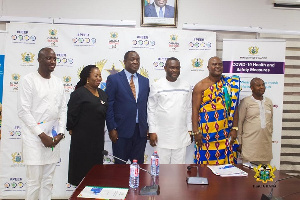 The newly reconstituted PIAC board will be headed by Professor Kwame Adom-Frimpong
The newly reconstituted PIAC board will be headed by Professor Kwame Adom-Frimpong
• The newly reconstituted PIAC board has been tasked to deliver on its mandate
• John Kumah said PIAC must continue its mandate of efficient use of petroleum resources
• The reconstituted board will be headed by Professor Kwame Adom-Frimpong
The newly reconstituted board of the Public Interest and Accountability Committee (PIAC) has been tasked to judiciously execute its mandate in ensuring citizens benefit from the exploitation of Ghana’s petroleum resources.
Deputy finance minister, John Kumah, speaking at the inauguration of the board on Tuesday September 28, 2021, pointed that PIAC, since its establishment, has impacted positively on the management and use of petroleum revenues in the country.
“Government’s recognition of this is demonstrated not only in ensuring stable financial support to its programmes and providing office accommodation for the Secretariat, but even to the extent that the President Nana Addo Dankwa Akufo-Addo was present himself to launch PIAC’s 10th-anniversary celebration on March 25, 2021, in Accra”, Kumah said.
He added, “Your appointment is a call to public service, and I am confident that you will justify the trust that your nominating institutions, the government and people of Ghana have reposed in your diverse expertise and capacity.”
The deputy finance minister added that government was keen on engaging and supporting PIAC where necessary while respecting the Committee’s independence as captured in its Act.
Meanwhile, the newly reconstituted PIAC board will be headed by Professor Kwame Adom-Frimpong.
Other members of the board are Mr Nasir Alfa Mohammed, Ghana Bar Association; M. Bashiru Abdul-Razak, Ghana Extractive Industries Transparency Initiative; Mrs Clara Beeri Kasser-Tee, Independent Policy Research Think Tanks and Odeefuo Amoakwa Buadu VIII, National House of Chiefs.
PIAC was first established in 2011 by Section 51 of the Petroleum Revenue Management Act, 2011 (Act 815) as amended and inaugurated to serve as an independent statutory body mandated to promote transparency and accountability in the management of petroleum revenues in Ghana.